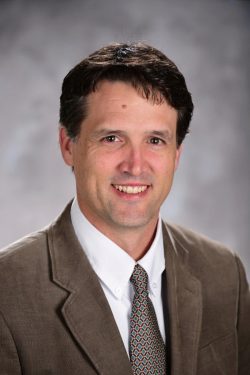 |
| Prof. Brian Gunter |
School of Aerospace Engineering professor Brian Gunter is one of more than a dozen Georgia Tech faculty and students giving presentations at the First Annual Symposium on Space Innovations (SSI), to be held at Georgia Tech Oct. 18 and 19.
Headlining this first annual symposium on space innovations will GT alumnus Shane Kimbrough, an accomplished NASA astronaut who recently completed a six-month assignment as commander of the International Space Station. He will be joined by Center for Science Technology and Research (C-STAR) director Thomas Orlando, CHBE professor Martha Grover, and more than 10 faculty and AE students who are also presenting papers and posters at the event.
“The symposium will enable participants to share recent progress and opportunities in the space industry with professionals and academics who want to network and learn,” said Prof. E. Glenn Lightsey, one of the event organizers.
“Georgia Tech is naturally positioned to be an innovation hub for space because of the number of faculty, scientists, engineers, and students who are working on space-related topics."
Gunter's paper, "The Ranging and Nanosatellite Guidance Experiment (RANGE) " will explore the upcoming launch of RANGE, a cubesat mission that is focused on improving of the relative and absolute positioning capabilities of nanosatellites.
"The satellites’ absolute positions will be tracked using GPS receivers synchronized with miniaturized atomic clocks, and will be validated using ground-based laser ranging measurements," he said.
"The results of the mission should serve to enable more advanced payloads and future mission concepts involving formations and constellations of nanosatellites. The presentation will give an overview of the mission design and status, as well as the key innovations and expected outcomes."
Eleven Georgia Tech students studying aerospace engineering are presenting in five tracks:
Small Satellite Track
- Tanish Himani, graduate student, "Micronimbus: Transitioning from Preliminary Design to a Flight-Capable CubeSat Mission," 4:25-4:45 PM
- Swapnil Pujari, graduate student, "Prox-1 Flight Systems Integration and Testing, Methodologies, Experiences, and Lessons Learned" 10:40-11:00 AM
- Brian Weaver, undergraduate, "Development of Deployable Inflatable Target for Evaluation of the TARGIT CubeSat Mission's LiDAR Payload," 3:05-3:25 PM
Space Launch, Landing, and Spaceports
- Kenneth Hart, graduate student, "Modeling Landing Site Damage Due to Retrorocket Plume Impingement," 3:25-3:45 PM
Emerging Technologies and Applications
- Chris Carter, undergraduate, "Robust Targeting for the Smartphone Video Guidance Sensor," 10:40-11:00 AM
Student Activities and Programs
- Yash Chandramouli, undergraduate, "3D Forensic Visualization of On-Orbit Debris Generation Events," 4:25-4:45 PM
- Theresa Polly, undergraduate, "Navigating Student Constraints in Launch Vehicle Structural Development,"4:05-4:25 PM
- Joseph Sparta, undergraduate, "Enabling Deep Space Exploration with an In-Space Propellant Depot Supplied from Lunar Ice," 3:25-3:45 PM
Poster Sessions, to be held On Oct. 18 at 5:30-7:00 PM at the Marcus Nanotechnology Research Building, 345 North Ave NW, Atlanta, GA 30332
- Trenton Charlson, undergraduate,"YJSP - The Student-Run Space Program,"
- Neel Dutta, undergraduate, "This is a Test: A Scalable 1-3DOF Active Rocket Control Test Rig"
- Michael Van Akin, undergraduate, "Yellow Jacket Space Program Liquid Rocket Engine Real-Time Model"